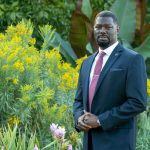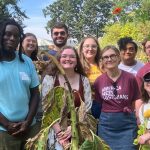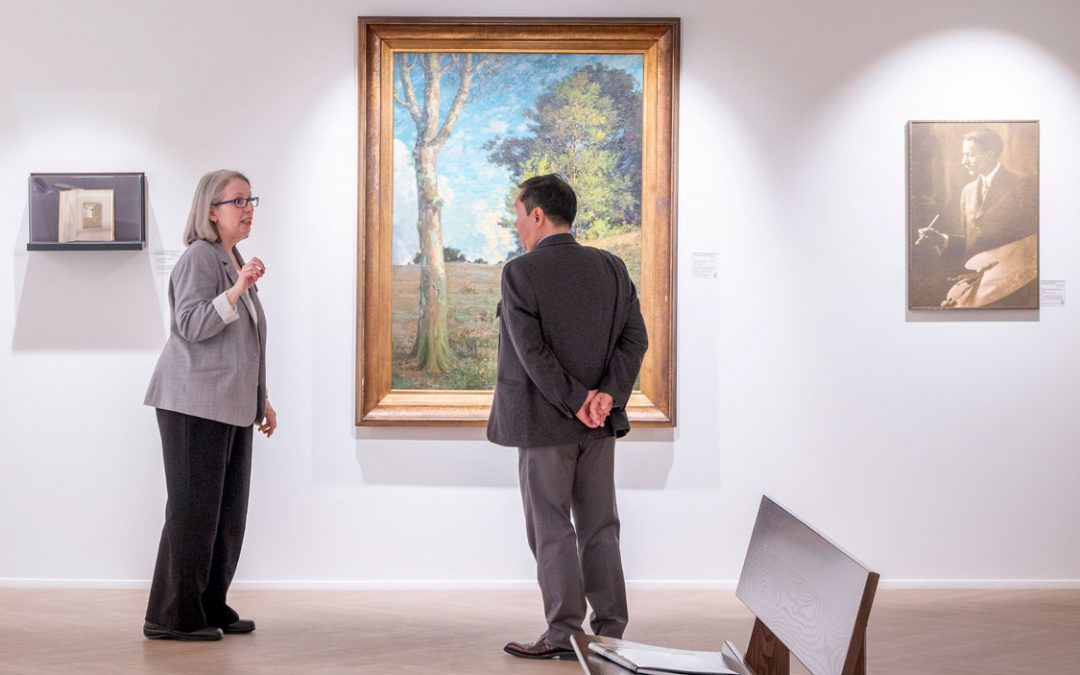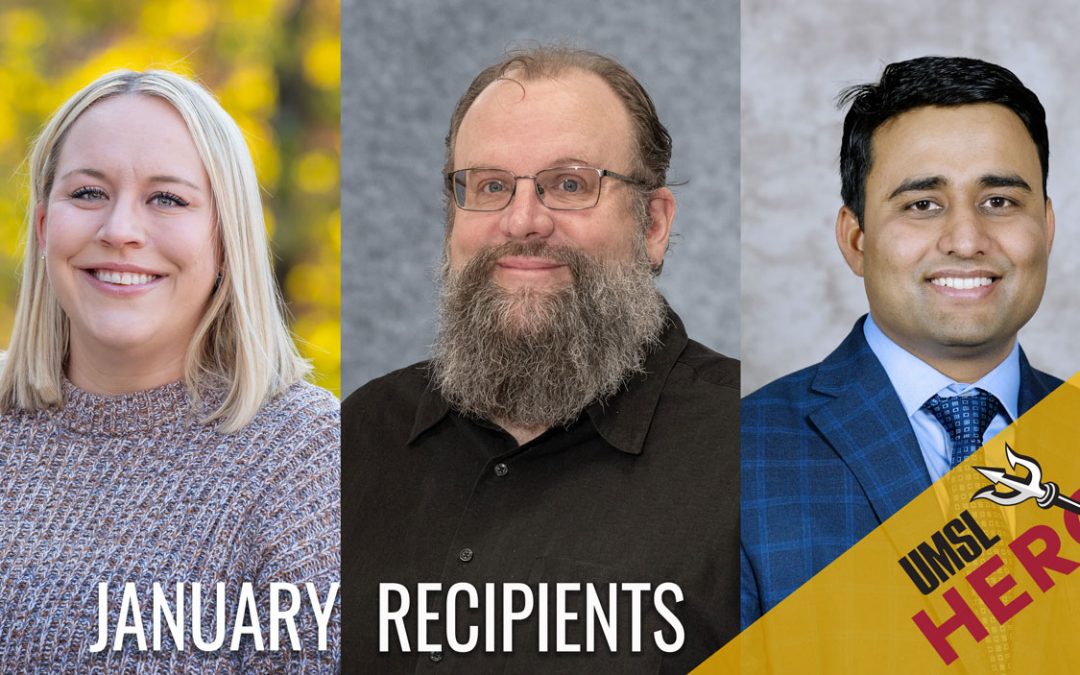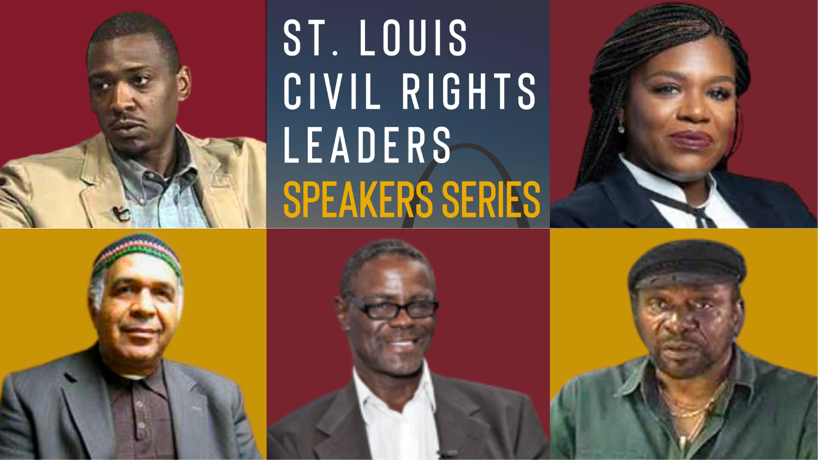
The St. Louis Civil Rights Leaders Speakers Series, organized by the Pierre Laclede Honors College, provided students an opportunity to engage with pioneering and modern activists. The series of five town halls featured (top from left) David Ragland, Cori Bush, (bottom from left) Zaki Baruti, Sylvester Brown and Percy Green. (Photos courtesy of the Honors College)
Zaki Baruti characterized the movement for racial equity as a “long road.”
From his first protest against the 1969 police shootings of Fred Hampton and Mark Clark in Chicago to Michael Brown’s death in 2014 and now the shootings of George Floyd and Breonna Taylor, he has been a key player in advocating for justice.
On October 20, Baruti – the president/general of the Universal African Peoples Organization, publisher of the African News World and former candidate for Missouri governor – reflected on his decades of activism and his hope for the next generation of leaders in the movement to an audience of 26 Zoom attendees.
It was part of the St. Louis Civil Rights Leaders Speakers Series at the University of Missouri–St. Louis. Organized by the Pierre Laclede Honors College, the series connects students with pioneering and modern activists, providing them an opportunity to engage with issues related to racial equity.
“This is not just stories from the past,” said Rob Wilson, assistant teaching professor and community engagement coordinator for the Honors College. “We want students to realize this really matters in this current political climate, in this current situation. This affects every single one of us. I want students to think and reflect and experience and get outside the classroom walls in a way they never have before.”
The series was comprised of five town hall events held via Zoom. To maintain an intimate feel and provide opportunities for optimal engagement, registration was limited to 35 honors students per session.
At the second town hall of the series, Baruti gave a brief overview of his work as an activist and answered questions from attendees.
Early in the discussion, he reflected on Brown’s death in Ferguson and how it created a shift in the movement for racial justice.
“For me, Michael Brown’s death signaled a whole new wave of leadership in the Black community coming from the younger segment,” he said. “It spoke volumes to the ongoing fight against police violence in the Black community. In fact, it took me back to my very first community organizing event. I was infuriated to such an extent that I organized. You had a very sustained movement of resistance to this kind of victimization of Black people, led many times by the younger generation that had been fed up with the kind of treatment of Black people in this country.”
The discussion went on to cover education, the role of the Black Panthers, the connection between racism and classism, economic reparations and more. Baruti also addressed protesting and its importance in the movement for racial equity.
“I’m 73 years of age right now, and I’ve been on so many different protests peacefully,” he said. “But again, we just saw this year the vicious death of George Floyd and Breonna Taylor. We could go on and on and on. But without protest, those issues would be swept under the rug, so I always continue to advocate that protest is important.”
The four other speakers in the series, who have also employed protest as part of their activism, include:
- David Ragland, the director of the campaign for Truth and Reparations and co-founder and co-director of the Truth Telling Project
- Cori Bush, a St. Louis native and candidate for U.S. Congress
- Percy Green, a legendary St. Louis activist and plaintiff in the landmark case McDonnell Douglas Corp v. Green
- Sylvester Brown, a writer for The St. Louis American and founder of the Sweet Potato Project to restore economic activity in north St. Louis
Baruti, Green and Brown were previously involved with an honors class called Beyond the Buildings, in which students interviewed and filmed them for a short historical documentary on the civil rights movement in St. Louis.
This semester, the Honors College is offering a class focused on civil rights as well as a cultural traditions course required for all first-year honors students.
The speakers series gave students a chance to engage with people who are actively involved in promoting racial justice – bringing life to topics discussed in class.
“We wanted to enhance the conversations that they’re already having in their classrooms,” Wilson said. “We wanted to break down the walls and have them meet some community leaders who are involved in activism and in issues of race and politics. It’s a chance for them to really engage with people who have been on the front lines of activism – people who have been fighting for racial justice for the majority of their life.”
As Baruti reflected over spending decades as an activist, he looked toward the future with hope and encouraged attendees to get involved in advocating for change.
“My message to young people is that this movement for social justice, it’s a protracted struggle,” he said. “If you’re going to be involved in the movement, you’ve got to understand overall victory may not be right away. This is a long struggle, a long road to justice and equality. This is a glorious and a most needed involvement from those of you who understand that change must come.”







